2018年闵行二模作文讲评
闵行2018学年第二学期高三语文范文
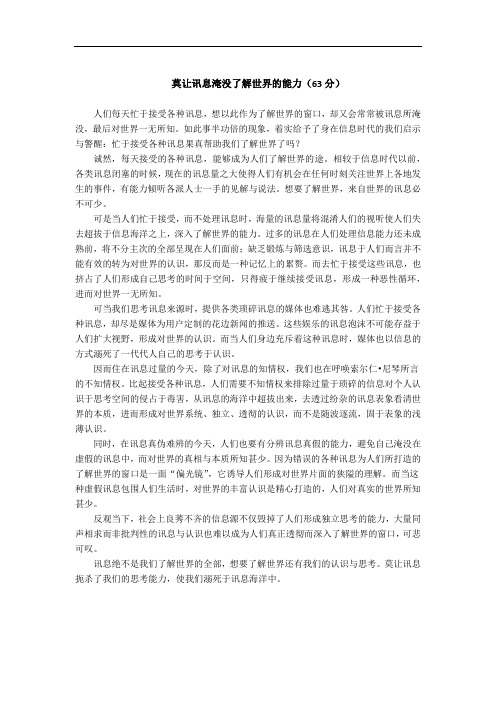
莫让讯息淹没了解世界的能力(63分)人们每天忙于接受各种讯息,想以此作为了解世界的窗口,却又会常常被讯息所淹没,最后对世界一无所知。
如此事半功倍的现象,着实给予了身在信息时代的我们启示与警醒:忙于接受各种讯息果真帮助我们了解世界了吗?诚然,每天接受的各种讯息,能够成为人们了解世界的途。
相较于信息时代以前,各类讯息闭塞的时候,现在的讯息量之大使得人们有机会在任何时刻关注世界上各地发生的事件,有能力倾听各派人士一手的见解与说法。
想要了解世界,来自世界的讯息必不可少。
可是当人们忙于接受,而不处理讯息时,海量的讯息量将混淆人们的视听使人们失去超拔于信息海洋之上,深入了解世界的能力。
过多的讯息在人们处理信息能力还未成熟前,将不分主次的全部呈现在人们面前;缺乏锻炼与筛选意识,讯息于人们而言并不能有效的转为对世界的认识,那反而是一种记忆上的累赘。
而去忙于接受这些讯息,也挤占了人们形成自己思考的时间于空间,只得疲于继续接受讯息,形成一种恶性循环,进而对世界一无所知。
可当我们思考讯息来源时,提供各类琐碎讯息的媒体也难逃其咎。
人们忙于接受各种讯息,却尽是媒体为用户定制的花边新闻的推送。
这些娱乐的讯息泡沫不可能存益于人们扩大视野,形成对世界的认识。
而当人们身边充斥着这种讯息时,媒体也以信息的方式溺死了一代代人自己的思考于认识。
因而住在讯息过量的今天,除了对讯息的知情权,我们也在呼唤索尔仁•尼琴所言的不知情权。
比起接受各种讯息,人们需要不知情权来排除过量于琐碎的信息对个人认识于思考空间的侵占于毒害,从讯息的海洋中超拔出来,去透过纷杂的讯息表象看清世界的本质,进而形成对世界系统、独立、透彻的认识,而不是随波逐流,固于表象的浅薄认识。
同时,在讯息真伪难辨的今天,人们也要有分辨讯息真假的能力,避免自己淹没在虚假的讯息中,而对世界的真相与本质所知甚少。
因为错误的各种讯息为人们所打造的了解世界的窗口是一面“偏光镜”,它诱导人们形成对世界片面的狭隘的理解。
上海市闵行区2018届高三英语二模试卷及答案

2018.5 闵行(松江)区高考英语质量抽查试卷(满分:140分考试时间:120分钟)I. Listening ComprehensionSection ADirections: In Section A, you will hear ten short conversations between two speakers At the end of each conversation, a question will be asked about what was said. The conversations and the questions will be spoken only once. After you hear a conversation and the question about it, read the four possible answers on your paper, and decide which one is the best answer to the question you have heard.1. A. He will review 2 more lessons. B. He will study the other 20 lessons.C. He will go over the 13 lessons.D. He will study all the 15 lessons.2. A. His injury kept him at home. B. He didn’t think it necessary.C. He was too weak to see the doctor.D. He failed to make an appointment.3. A. The post office. B. Monroe Street.C. The courthouse.D. Fourth Avenue.4. A. Disappointed. B. Approving. C. Concerned. D. Doubtful.5. A. He played his part quite well. B. He was not dramatic enough.C. He performed better than the secretary.D. He exaggerated his part.6. A. He wrote a book about great restaurants. B. He always makes reservations for dinner.C. He read a book while he was eating dinner.D. He always finds good places to eat.7. A. He is afraid he won’t be chosen for the trip.B. The boss has not decided where to go.C. Such a trip is necessary for the company.D. It’s not certain whether the trip will take place.8. A. It’s too expensive to get the apartment furnished.B. The furniture he bought was very cheap.C. The apartment was provided with some old furniture.D. It’s hard to find proper furniture for his apartment.9. A. She is intended to work for the school newspaper.B. The man can spare some time reading school newspaper.C. The man has a very tight schedule.D. The man should have taken more than five classes.10. A. Whether the meeting is certainly to be held on Monday.B. What bad news will be talked about at the meeting.C. What they are going to discuss at the meeting.D. Where the meeting is to be held.Section BDirections: In Section B, you will hear two short passages and one longer conversation, and you will be asked several questions on each of the passages and the conversation. The passages and the conversation will be read twice, but the questions will be spoken only once. When you hear a question, read the four possible answers on your paper and decide which one would be the best answer to the question you have heard.Questions 11 through 13 are based on the following passage.11. A. Appropriateness of the programs. B. The operation of national programs.C. The incomes of the corporation.D. The welfare of the staff.12. A. By donations from the public. B. By selling its programs.C. By selling broadcasting devices.D. By getting support from the royals.13. A. Its humorous styles. B. The richness of its programs.C. Famous news announcers.D. Its neutral views on news.Questions 14 through 16 are based on the following passage.14. A. Social progress and individual development.B. Human behaviors and social changes.C. General concepts about psychology and sociology.D. Relationship between cultures and human behaviors.15. A. What is the role of religion or art in a society?B. What is the main reason for revolution in a society?C. What are the causes of antisocial behavior?D. Why does one society progress more rapidly than another?16. A. Both psychology and sociology study human behavior.B. Mental problems should be dealt with by a sociologist.C. Sociology is the study of group behavior.D. Psychology pays more attention to individuals than to groups.Questions 17 through 20 are based on the following conversation.17. A. It looks into opinions that people hold about old age.B. It is about how to keep healthy in old age.C. It investigates causes of old people’s unhappiness.D. It reveals the secret of living longer.18. A. Arise people’s awareness of caring for the old.B. Encourage people to be more responsible for the old.C. Help people change their feelings about old age.D. Ease people’s fear and anxiety about mental illness of the old.19. A. They are mostly among the 60-70 age group.B. They are mostly abandoned by their families.C. People do not become more lonely because of old age.D. People among any age group are not lonely at all.20. A. They are changing suddenly and completely at a particular age.B. It’s hard to recognize a person when he is turning old.C. Old people can’t deal with events and problems properly.D. People do not change in old age a lot more than in middle age.II. Grammar and VocabularySection ADirections:After reading the passage below, fill in the blanks to make the passage coherent and grammatically correct. For the blanks with a given word, fill in each blank with the proper form ofthe given word; for the other blanks, use one word that best fits each blank.Aunt Jane is now well over seventy, but she is still a great cinema-goer. The cinema in our town closed down years ago and sometimes she has to travel twenty miles or more to see a good film. And once a month at least she goes up to London to see (21)________(late) foreign films. Of course she could see most of these films on television, but the idea does not attract her. “It isn’t the same,” she says. “For one thing, the screen’s too small. Besides, I like going to the cinema!”However, one thing which has always puzzled us is that (22)________ Aunt Jane has lots of friends and enjoys company, she always goes to the cinema alone. We discovered the reason for this only recently—from Mother. “It may surprise you to learn that Aunt Jane wanted to be an actress when she was young,” she told us. “She used to wait outside film studios all day, just (23)________(appear) in crowd scenes. Your aunt has probably appeared in dozens of films. Sometimes she did not even know the name of the film they (24)________(make). Therefore, she couldn’t go to see (25)________ in the film at the cinema!“All the time, of course, she was looking for a small part in a film. Her big chance came (26)________ they started to make a film in our town. Jane managed to meet the director at a party and he offered her (27)________ role as a shopkeeper. It really was a very small part, but it was an important moment for Jane. Before the great event, she rehearsed for days. In fact, she turned the sitting-room into a shop! We all had to help, going to and out of the shop (28)_______ she could remember her words perfectly. And (29)________ the actual day she was marvelous. Jane thought that this was the beginning of her film career!“Unfortunately, in the end, they did not include the shop scene in the film. But nobody told Jane! When the film first appeared in London, she took all her friends to see it. And of course she wasn’t in it! It was a terrible blow! She stopped (30)________ (go) to film studios and gave up the idea of becoming an actress. She still loves the cinema, as you all know, but from that day she has always gone alone!”Section BDirections: Complete the following passage by using the words in the box. Each word can only be(班卓琴) song, you’re probably (31)______ following the age-old advice that practice makes perfect. However, contrary to popular belief, doing the same thing over and over again might not be the most efficient way to learn foreign concepts.Traditionally, we’re taught using the “blocking” strategy. This instructs us to go over a single idea again and again until we’ve mastered it, before (32)______ to the next concept. But several new neurological (神经学的) (33)______ show that an up and coming learning method called “interleaving” improves our ability to keep and perform new skills over any traditional means by leaps and bounds.What interleaving does is to space out learning over a longer period of time, and it (34)______ the information we encounter when learning a new skill. So, for example, instead of learning one banjo chord at a time until you (35)______ it, you train in several at once and in shorter bursts.One of the practical ways you can use interleaving to train your brain to pick up new skillsquickly and effectively is to practice multiple (36)______ skills at once.Whether you’re trying to improve your motor skills or cognitive (认知的) learning abilities, the key to (37)______ how your brain processes new information is to break out of the habit of learning one part of a skill at a time. The advantage of this method is that your brain doesn’t get comfortable or store information in your short-term memory. Instead, interleaving causes your brain to (38)______ focus and problem-solve every step of the way, resulting in information getting stored in your long-term memory instead.Interleaving doesn’t cut any corners, so your brain is always on (39)______. Think of the difference between blocking and interleaving like a boxer who practices one (40)______ over and over again versus a boxer who practices by sparring in the ring. In the ring, you have to be ready for anything. It makes you faster and sharper.III. Reading ComprehensionSection ADirections: For each blank in the following passage there are four words or phrases marked A, B, C and D. Fill in each blank with the word or phrase that best fits the context.Since 1960, considerable scientific researches have been done on chimps in their natural habitats. Astonishingly, scientists have found out that the social 41 of Chimps are very similar to humans. Chimps will 42 in certain ways, like gathering in war parties to protect their territory. But beyond the minimum requirements as social beings, they have little instinct to 43 one another. Chimps in the wild seek food for themselves. Even chimp mothers regularly 44 to share food with their children. Who are able from a young age to gather their own food?In the laboratory, chimps don’t 45 share food either. If a chimp is put in a cage where he can pull in one plate of food for himself or, with no greater effort, a plate that also provides food for a neighbor to the next cage, he will pull 46 -- he just doesn’t care whether his neighbor gets fed or not. Chimps are truly selfish.Human children, 47 , are extremely cooperative. From the earliest ages, they decide to help others, to share information and to participate in achieving common goals. The psychologist Michael Tomasello has studied this 48 in a series of experiments with very young children. He finds that if babies aged 18 months see a worried adult with hands full trying to open a door, almost all will immediately try to help.There are several reasons to believe that the urges to help, inform and share are not taught, but naturally 49 in young children. One is that these 50 appear at a very young age before most parents have started to train their children to behave 51 . Another is that the helping behaviors are not improved if the children are rewarded. A third reason is that social intelligence 52 in children before their general cognitive skills, at least when compared with chimps. In tests conducted by Tomasello, the human children did no better than the chimps on the 53 world tests but were considerably better at understanding the social world.The core of what children’s minds have and chimps’ don’t is what Tomasello calls shared intentionality. Part of this ability is that they can 54 what others know or are thinking. But beyond that, even very young children want to be part of a shared purpose. They actively seek to be part of a “we”, a group that intends to work toward a(n) 55 goal.41. A. structures B. policies C. behaviors D. responsibilities42. A. conflict B. cooperate C. offend D. negotiate43. A. trust B. contact C. isolate D. help44. A. decline B. manage C. attempt D. oblige45. A. curiously B. reluctantly C. naturally D. carelessly46. A. in turn B. at random C. with care D. in advance47. A. all in all B. as a result C. in no case D. on the other hand48. A. cooperativeness B. availability C. interrelationship D. attractiveness49. A. cultivated B. motivated C. possessed D. stimulated50. A. attitudes B. instincts C. experiences D. coincidences51. A. creatively B. formally C. socially D. competitively52. A. develops B. decreases C. changes D. disappears53. A. abstract B. invisible C. imaginary D. physical54. A. infer B. adapt C. absorb D. balance55. A. realistic B. shared C. specific D. ambitiousSection BDirections:Read the following three passages. Each passage is followed by several questions or unfinished statements. For each of them there are four choices marked A. B. C and D. Choose the one that fits best according to the information given in the passage you have just read.(A)If a diver surfaces too quickly, he may suffer the bends.Nitrogen (氮) dissolved in his blood is suddenly liberated bythe reduction of pressure. The consequence, if the bubblesaccumulate (累积) in a joint, is sharp pain and a bent body—thus the name. If the bubbles form in his lungs or his brain, theconsequence can be death.Other air-breathing animals also suffer thisdecompression (减压) sickness if they surface too fast: whales,for example. And so, long ago, did ichthyosaurs. That theseancient sea animals got the bends can be seen from their bones. If bubbles of nitrogen form inside the bone they can cut off its blood supply. This kills the cells in the bone, and consequently weakens it, sometimes to the point of collapse. Fossil bones that have caved in on themselves are thus a sign that the animal once had the bends.Bruce Rothschild of the University of Kansas knew all this when he began a study of ichthyosaur bones to find out how widespread the problem was in the past. What he particularly wanted to investigate was how ichthyosaurs adapted to the problem of decompression over the 150 million years. To this end, he and his colleagues traveled the world’s natural-history museums, looking at hundreds of ichthyosaurs from the Triassic period and from the later Jurassic and Cretaceous periods.When he started, he assumed that signs of the bends would be rarer in younger fossils, reflecting their gradual evolution of measures to deal with decompression. Instead, he was astonished to discover the opposite. More than 15% of Jurassic and Cretaceous ichthyosaurs had suffered the bends before they died, but not a single Triassic specimen (标本) showed evidence of that sort of injury.If ichthyosaurs did evolve an anti-decompression means, they clearly did so quickly—and,most strangely, they lost it afterwards. But that is not what Dr. Rothschild thinks happened. He suspects it was evolution in other animals that caused the change.Whales that suffer the bends often do so because they have surfaced to escape a predator (掠食性动物) such as a large shark. One of the features of Jurassic oceans was an abundance of large sharks and crocodiles, both of which were fond of ichthyosaur lunches. Triassic oceans, by contrast, were mercifully shark and crocodile-free. In the Triassic, then, ichthyosaurs were top of the food chain. In the Jurassic and Cretaceous, they were prey (猎物) as well as predator—and often had to make a speedy exit as a result.56. Which of the following is a typical symptom of the bends?A. A twisted body.B. A gradual decrease in blood supply.C. A sudden release of nitrogen in blood.D. A drop in blood pressure.57. The purpose of Rothschild’s study is to see ________.A. how often ichthyosaurs caught the bendsB. how ichthyosaurs adapted to decompressionC. why ichthyosaurs bent their bodiesD. when ichthyosaurs broke their bones58. Rothschild’s finding stated in Paragraph 4 ________.A. confirmed his assumptionB. speeded up his research processC. disagreed with his assumptionD. changed his research objectives59. Rothschild might have concluded that ichthyosaurs ________.A. failed to evolve an anti-decompression meansB. gradually developed measures against the bendsC. died out because of large sharks and crocodilesD. evolved an anti-decompression means but soon lost it(B)However wealthy we may be, we can never find enough hours in the day to do everything we want. Economics deals with this problem through the concept of opportunity cost, which simply refers to whether someone’s time or money could be better spent on something else.Every hour of our time has a value. For every hour we work at one job we could quite easily be doing another, or be sleeping or watching a film. Each of these options has a different opportunity cost—namely, what they cost us in missed opportunities.Say you intend to watch a football match but the tickets are expensive and it will take you a couple of hours to get to and from the stadium. Why not, you might reason, watch the game from home and use the leftover money and time to have dinner with friends? This—the alternative use of your cash and time—is the opportunity cost.For economists, every decision is made by knowledge of what one must forgo—in terms of money and enjoyment—in order to take it up. By knowing precisely what you are receiving and what you are missing out on, you ought to be able to make better-informed, more reasonable decisions. Consider that most famous economic rule of all: there’s no such thing as a free lunch. Even if someone offers to take you out to lunch for free, the time you will spend in the restaurant still costs you something in terms of forgone opportunities.Some people find the idea of opportunity cost extremely discouraging: imagine spending your entire life calculating whether your time would be better spent elsewhere doing something more profitable or enjoyable. Yet, in a sense it’s human nature to do precisely that we assess theadvantages and disadvantages of decisions all the time.In the business world, a popular phrase is “value for money.” People want their cash to go as far as possible. However, another is fast obtaining an advantage: “value for time.” The biggest restriction on our resources is the number of hours we can devote to something, so we look to maximize the return we get on our investment of time. By reading this passage you are giving over a bit of your time which could be spent doing other activities, such as sleeping and eating. In return, however, this passage will help you to think like an economist, closely considering the opportunity cost of each of your decisions.60. According to the passage, the concept of “opportunity cost” is applied to ______.A. making more moneyB. taking more opportunitiesC. reducing missed opportunitiesD. weighing the choice of opportunities61. The “leftover money and time” in Paragraph 3 probably refers to the time ______.A. spared for watching the match at homeB. taken to have dinner with friendsC. spent on the way to and from the matchD. saved from not going to watch the match62. What are forgone opportunities?A. Opportunities you forget in decision-making.B. Opportunities you give up for better ones.C. Opportunities you miss accidentally.D. Opportunities you make up for.(C)Of all the components of a good night’s sleep, dreams seem to be least within our control. In dreams, a window opens into a world where logic is suspended and dead people speak. A century ago, Freud stated his revolutionary theory that dreams were the disguised (伪装的) shadows of our unconscious desires and fears; by the late 1970s, neurologists had switched to thinking of them as just “mental noise” — the random byproducts of the neural-repair work that goes on during sleep. Now researchers suspect that dreams are part of the mind’s emotional thermostat, regulating moods while the brain is “off-line”. And one leading authority says that these intensely powerful mental events can be not only influenced but actually brought under conscious control, to help us sleep and feel better. “It’s your dream,” says Rosalind Cartwright, chair of psychology at Chicago’s Medical Center. “If you don’t like it, change it.”The link between dreams and emotions shows up among the patients in Cartwright’s clinic. Most people seem to have more bad dreams early in the night, progressing toward happier ones before awakening, suggesting that they are working through negative feelings generated (产生) during the day. Because our conscious mind is occupied with daily life, we don’t always think about the emotional significance of the day’s events — until, it appears, we begin to dream.And this process need not be left to the unconscious. Cartwright believes one can exercise conscious control over repeated bad dreams. As soon as you awaken, identify what is upsetting about the dream. Visualize how you would like it to end instead; the next time it occurs, try to wake up just enough to control its course. With much practice people can learn to, literally, do it in their sleep.At the end of the day, there’s probably little reason to pay attention to our dreams at all unless they keep us from sleeping or “we wake up in a panic,” Cartwright says. Terrorism, economic uncertainties and general feelings of insecurity have increased people’s anxiety. Those suffering from persistent nightmares should seek help from a therapist. For the rest of us, the brain has itsways of working through bad feeling. Sleep — or rather dream — on it and you’ll feel better in the morning.63. By saying that “dreams are part of the mind’s emotional thermostat” in paragraph 1, theresearchers mean that ______.A. dreams can help us keep our mood comparatively stableB. dreams can be brought under conscious controlC. dreams represent our unconscious desires and fearsD. we can think logically in the dreams too64. The negative feelings generated during the day tend to ______.A. become worse in our unconscious mindB. develop into happy dreamsC. persist till the time we fall asleepD. show up in dreams early at night65. Cartwright believed with much practice, we can learn to ______.A. control what dreams to dreamB. sleep well without any dreamsC. wake up in time to stop the bad dreamsD. identify what is upsetting about the dreams66. Cartwright might advise those who sometimes have bad dreams to ______.A. lead their life as usualB. seek professional helpC. exercise conscious controlD. avoid anxiety in the daytimeSection CDirections: Read the following passage. Fill in each blank with a proper sentence given in the box.Choosing the right time to sleep, the correct moment to make decisions, the best hour to eat—and even go into hospital—could be your key to perfect health.Centuries after man discovered the rhythms of the planets and the cycles of crops, scientists have learned that we too live by precise rhythms that govern everything from our basic bodily functions to mental skills. Man is a prisoner of time.But it’s not just the experts who are switching on to the way our bodies work. 67 Prince Charles consults a chart which tells him when he will be at his peak on a physical, emotional and intellectual level. Boxer Frank Bruno is another who charts his bio-rhythms to plan for big fights.68 Sleep, blood pressure, hormone levels and heartbeat all follow their own clocks, which may bear only slight relation to our man-made 24-hour cycle.Research shows that in laboratory experiments when social signals and, most importantly, light indicators such as dawn are taken away, people lose touch with the 24-hour clock and sleeping patterns change. Temperature and heartbeat cycles lengthen and settle into “days” lasting about 25 hours.In the real world, light and dark keep adjusting internal clock to the 24-hour day. But the best indicator of performance is body temperature. As it falls from a 10 p.m. high of 37.2°C to a pre-dawn low of 36.1°C, mental functions fall too. 69The most famous example is the nuclear accident at Three Mile Island in the US. The three operators in the control room worked alternating weeks of day, evening and night shifts.70 Investigators believe this caused the workers to overlook a warning light and fail to close an open valve.Finding the secret of what makes us tick has long fascinated scientists and work done over the last decade has yielded important clues. The aim is to help us become more efficient. For example, the time we eat may be important if we want to maximize intellectual or sporting performance. There is already evidence suggesting that the time when medicine is given to patients affects how well it works.IV. Summary WritingDirections:Read the following passage. Summarize the main idea and the main point(s) of the passage in no more than 60 words. Use your own words as far as possible.Quiet Virtue: The ConscientiousThe everyday signs of conscientiousness (认真尽责)—being punctual, careful in doing work, self-disciplined, and scrupulous (一丝不苟的) in attending to responsibilities—are typical characteristics of the model organizational citizen, the people who keep things running as they should. They follow the rules, help out, and are concerned about the people they work with. It’s the conscientious worker who helps newcomers or updates people who return after an absence, who gets to work on time and never abuses sick leaves, who always gets things done on deadline. Conscientiousness is a key to success in any field. In studies of job performance, outstanding effectiveness for almost all jobs, from semi-skilled labor to sales and management, depends on conscientiousness. Among sales representatives for a large American car manufacturer, those who were most conscientious had the largest volume of sales.Conscientiousness also offers a buffer (缓冲) against the threat of job loss in today’s constantly changing market, because employees with this quality are among the most valued. For the sales representatives, their level of conscientiousness mattered almost as much as their sales in determining who stayed on.But conscientiousness in the absence of social skills can lead to problems. Since conscientious people demand so much of themselves, they can hold other people to their own standards, and so be overly judgmental when others don’t show the same high levels of model behavior. Factory workers who were extremely conscientious, for example, tended to criticize co-workers even about failures that seemed unimportant to those they criticized, which damaged their relationships.When conscientiousness takes the form of living up to expectations, it can discourage creativity. Success in creative professions like art or advertising calls for a balance between wild ideas and conscientiousness. Without enough conscientiousness to follow through, people become mere dreamers, with nothing to show for their imaginativeness.V. TranslationDirections:Translate the following sentences into English, using the words given in the brackets.72. 请把这封信寄给负责售后服务的人。
上海市闵行区2018届中考二模语文试题及答案
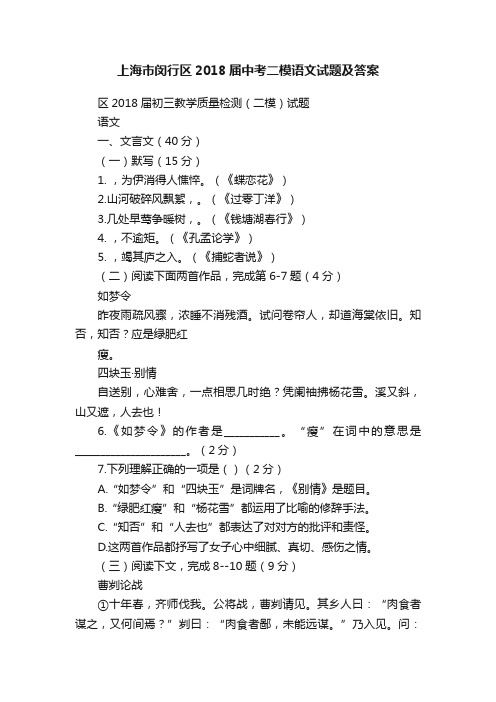
上海市闵行区2018届中考二模语文试题及答案区2018届初三教学质量检测(二模)试题语文一、文言文(40分)(一)默写(15分)1. ,为伊消得人憔悴。
(《蝶恋花》)2.山河破碎风飘絮,。
(《过零丁洋》)3.几处早莺争暖树,。
(《钱塘湖春行》)4. ,不逾矩。
(《孔孟论学》)5. ,竭其庐之入。
(《捕蛇者说》)(二)阅读下面两首作品,完成第6-7题(4分)如梦令昨夜雨疏风骤,浓睡不消残酒。
试问卷帘人,却道海棠依旧。
知否,知否?应是绿肥红瘦。
四块玉·别情自送别,心难舍,一点相思几时绝?凭阑袖拂杨花雪。
溪又斜,山又遮,人去也!6.《如梦令》的作者是___________。
“瘦”在词中的意思是______________________。
(2分)7.下列理解正确的一项是()(2分)A.“如梦令”和“四块玉”是词牌名,《别情》是题目。
B.“绿肥红瘦”和“杨花雪”都运用了比喻的修辞手法。
C.“知否”和“人去也”都表达了对对方的批评和责怪。
D.这两首作品都抒写了女子心中细腻、真切、感伤之情。
(三)阅读下文,完成8--10题(9分)曹刿论战①十年春,齐师伐我。
公将战,曹刿请见。
其乡人曰:“肉食者谋之,又何间焉?”刿曰:“肉食者鄙,未能远谋。
”乃入见。
问:“何以战?”公曰:“衣食所安,弗敢专也,必以分人。
”对曰:“小惠未徧,民弗从也。
”公曰:“牺牲玉帛,弗敢加也,必以信。
”对曰:“小信未孚,神弗福也。
”公曰:“小大之狱,虽不能察,必以情。
”对曰:“忠之属也。
可以一战。
战则请从。
”②公与之乘,战于长勺。
公将鼓之。
刿曰:“未可。
”齐人三鼓。
刿曰:“可矣。
”齐师败绩。
公将驰之。
刿曰:“未可。
”下视其辙,登轼而望之,曰:“可矣。
”遂逐齐师。
③既克,公问其故。
对曰:“夫战,勇气也。
一鼓作气,再而衰,三而竭。
彼竭我盈,故克之。
夫大国,难测也,惧有伏焉。
吾视其辙乱,望其旗靡,故逐之。
”8.下列加点字与“忠之属也”的“属”意思相同的一项是()(2分)A.诏令徒属曰B.神情与苏、黄不属C.属予作文以记之D.有良田、美食、桑竹之属9.用现代汉语翻译下面的句子。
2018年上海市闵行区初三英语二模试卷及答案(Word版)带讲解

闵行区2017 学年度第二学期初三年级学业质量调研英语学科试卷Part 1 Listening(第一部分听力)Part 2 Phonetics , Grammar and Vocabulary(第二部分语音、语法和词汇)II.Choose the best answer(选择最恰当的答案)1. Which of the following underlined parts is different in pronunciation from the others?A. I need double milk for my coffee.B. We are proud to be Chinese.C. The women shouted loudly for helpD. They are going to buy a new house.A句意:下面哪一个划线部分和其他的划线部分发音不同?根据double / aʊ /, proud/ aʊ/, shouted / aʊ/,house/ aʊ /,故选A。
2. Take a look at booklet on the shelf.It tells you how to use the new cooker.A. aB. anC. theD. /C句意:看一下书架上的那本小册子。
它告诉你如何使用那个新的炉子。
根据on the shelf修饰,故此处表示特指那个书架上的小册子,故用定冠词the修饰。
故选C。
3. Linda came back home half past ten last night.That's really too late.A. atB. onC. inD. forA句意:琳达在昨天晚上十点半回家。
那真的是太晚了。
根据后面接half past ten,表示在几点钟用介词at。
选A。
点睛:1. at后常接几点几分,天明,中午,日出,日落,开始等。
闵行区2018学年第二学期九年级质量调研考试(二模)语文试卷
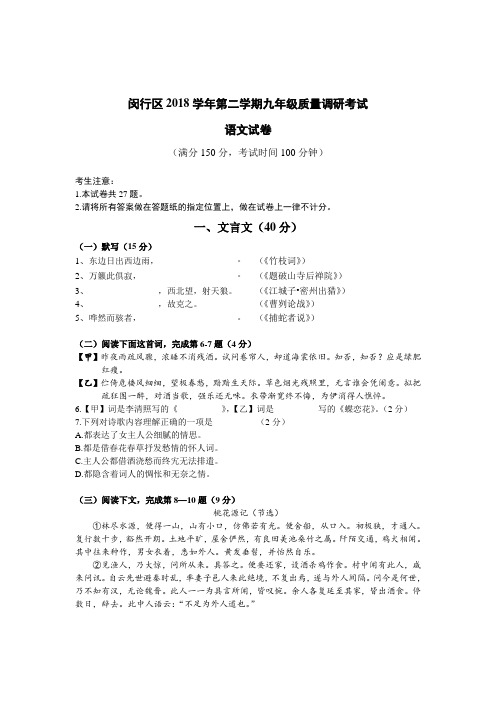
闵行区2018学年第二学期九年级质量调研考试语文试卷(满分150分,考试时间100分钟)考生注意:1.本试卷共27题。
2.请将所有答案做在答题纸的指定位置上,做在试卷上一律不计分。
一、文言文(40分)(二)阅读下面这首词,完成第6-7题(4分)【甲】昨夜雨疏风骤,浓睡不消残酒。
试问卷帘人,却道海裳依旧。
知否,知否?应是绿肥红痩。
【乙】伫倚危楼风细细,望极春愁,黯黯生天际。
草色烟光残照里,无言谁会凭阑意。
拟把疏狂图一醉,对酒当歌,强乐还无味。
衣带渐宽终不悔,为伊消得人憔悴。
6.【甲】词是李清照写的《__________》,【乙】词是__________写的《蝶恋花》。
(2分)7.下列对诗歌内容理解正确的一项是__________(2分)A.都表达了女主人公细腻的情思。
B.都是借春花春草抒发愁情的怀人词。
C.主人公都借酒浇愁而终宄无法排遣。
D.都隐含着词人的惆怅和无奈之情。
(三)阅读下文,完成第8—10题(9分)桃花源记(节选)①林尽水源,便得一山,山有小口,仿佛若有光。
便舍船,从口入。
初极狭,才通人。
复行数十步,豁然开朗。
土地平旷,屋舍俨然,有良田美池桑竹之属。
阡陌交通,鸡犬相闻。
其中往来种作,男女衣着,悉如外人。
黄发垂髫,并怡然自乐。
②见渔人,乃大惊,问所从来。
具答之。
便要还家,设酒杀鸡作食。
村中闻有此人,咸来问讯。
自云先世避秦时乱,率妻子邑人来此绝境,不复出焉,遂与外人间隔。
问今是何世,乃不知有汉,无论魏晋。
此人一一为具言所闻,皆叹惋。
余人各复延至其家,皆出酒食。
停数日,辞去。
此中人语云:“不足为外人道也。
”③既出,得其船,便扶向路,处处志之。
及郡下,诣太守,说如此。
太守即遣人随其往,寻向所志,遂迷,不复得路。
④南阳刘子骥,高尚士也,闻之,欣然规往。
未果,寻病终,后遂无问津者。
8.下列句中的加点词与“设酒杀鸡作食”的“作”意思最相近的是__________(3分)A.其中往来种作.B.若有作.奸犯科及为忠善者C. 一鼓作.气D.火爆声,呼呼风声,百千齐作.9.用现代汉语翻译下列句子(3分)乃不知有汉,无论魏晋。
2018上海各区二模作文解析及范文
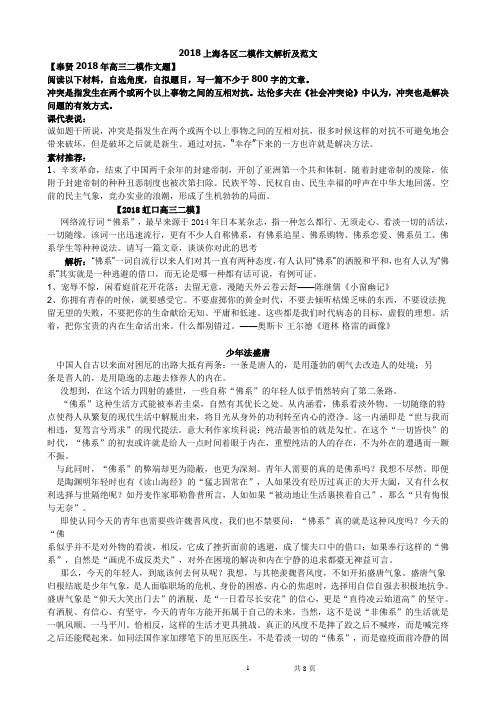
2018上海各区二模作文解析及范文【奉贤2018年高三二模作文题】阅读以下材料,自选角度,自拟题目,写一篇不少于800字的文章。
冲突是指发生在两个或两个以上事物之间的互相对抗。
达伦多夫在《社会冲突论》中认为,冲突也是解决问题的有效方式。
课代表说:诚如题干所说,冲突是指发生在两个或两个以上事物之间的互相对抗,很多时候这样的对抗不可避免地会带来破坏,但是破坏之后就是新生。
通过对抗,“幸存”下来的一方也许就是解决方法。
素材推荐:1、辛亥革命,结束了中国两千余年的封建帝制,开创了亚洲第一个共和体制。
随着封建帝制的废除,依附于封建帝制的种种丑恶制度也被次第扫除。
民族平等、民权自由、民生幸福的呼声在中华大地回荡。
空前的民主气象,竞办实业的浪潮,形成了生机勃勃的局面。
【2018虹口高三二模】网络流行词“佛系”,最早来源于2014年日本某杂志,指一种怎么都行、无须走心、看淡一切的活法,一切随缘。
该词一出迅速流行,更有不少人自称佛系,有佛系追星、佛系购物、佛系恋爱、佛系员工、佛系学生等种种说法。
请写一篇文章,谈谈你对此的思考解析:“佛系”一词自流行以来人们对其一直有两种态度,有人认同“佛系”的洒脱和平和,也有人认为“佛系”其实就是一种逃避的借口,而无论是哪一种都有话可说,有例可证。
1、宠辱不惊,闲看庭前花开花落;去留无意,漫随天外云卷云舒——陈继儒《小窗幽记》2、你拥有青春的时候,就要感受它。
不要虚掷你的黄金时代,不要去倾听枯燥乏味的东西,不要设法挽留无望的失败,不要把你的生命献给无知、平庸和低速。
这些都是我们时代病态的目标,虚假的理想。
活着,把你宝贵的内在生命活出来。
什么都别错过。
——奥斯卡·王尔德《道林·格雷的画像》少年法盛唐中国人自古以来面对困厄的出路大抵有两条:一条是唐人的,是用蓬勃的朝气去改造人的处境;另条是晋人的,是用隐逸的志趣去修养人的内在。
没想到,在这个活力四射的盛世,一些自称“佛系”的年轻人似乎悄然转向了第二条路。
2018届上海市闵行区高三下学期教育质量调研考试(二模)

2018届上海市闵行区高三下学期教育质量调研考试(二模)上海市闵行区2018届高三下学期教育质量调研考试(二模)地理试题(考试时间120分钟满分150分)考生注意:1.全卷共11页,包括两大题,第一大题(1-30小题)为选择题,第二大题(31-54小题)为综合分析题。
第二大题综合分析题包括共同部分(31-46小题)和选择部分(47-54小题)。
所有考生应完成第一大题和第二大题的共同部分试题;第二大题的选择部分分为A、B 两组,两组试题分值相同:A组(47-50小题)为考试手册中“任选模块一”的试题,B组(51-54小题)为“任选模块二”的试题;考生须任选一组答题,如果考生应答了两组试题,只对A组的应答进行评分。
2.请将全部答案写在答题纸上。
3.答题前,先将自己的姓名、学校填写清楚,并填涂准考证号,请仔细核对。
答题时选择题用2B铅笔按要求涂写,综合分析题用黑色水笔填写。
4.考试后只交答题纸,试卷由自己保留。
一、选择题(每小题只有一个正确答案。
每小题2分,共60分)(一)“Hi,有人在吗?”,2月13日(农历正月十四)早上849,休眠了十几天的“月球车玉兔”微博再次发声,一句简单的问候立刻引发了8万多次转发和5万余条评论。
1.玉兔的供电系统自其顶部的太阳能电池板,下列选项正确的是:A.玉兔每天600醒1800入眠B.玉兔休眠状态发生在月球进入月夜的时候C.月球自转一周的时间约需十几天D.早上849,玉兔大约位于上海的正南方2.人类把月球作为宇宙空间探测的第一站的主要原因是月球A.有高真空、强辐射、微重力的环境B.是距离地球最近的自然天体C.昼夜周期较长D.体积小,容易探测3.满月一般发生在农历十五,近两年元宵月却都是“十五的月亮十七圆”,根本原因是A.29.53天只是月相变化的平均周期B.月球的自转周期与公转周期相同C.朔望月比恒星月多2.21日D.白道面与黄道面有5o09′的交角(二)地球表面时刻不停地进行着水循环,读下图回答:4.据图中水平衡数值的大小判断A.低纬度地区大;降水多,蒸发弱B.低纬度地区小;降水少,蒸发弱C.高纬度地区大;降水多,蒸发弱D.高纬度地区小;降水少,蒸发弱5.从图中不同纬度海陆水平衡的差异可以推断出A.形成陆地降水的水汽主要自中低纬度海洋B.形成海洋降水的水汽主要自大陆C.形成陆地降水的水汽主要自高纬度海洋D.形成陆地降水的水汽主要自陆地(三)如右图,一艘轮船沿图中的航线从印度洋驶向大西洋,行进到①处时正看到海上日落,此时刚好是北京时间000。
二模讲评(2018)13班

第二部分文言文阅读(15分)(二模)
数据统计: 1班平均分9.71分,得分率64.8%;3班平均分13.24分,得分 率88.3%。 1班最高分14分程佳怡、李嘉毅、曾智星、欧阳珏,最低3分; 3班满分梁卓岚等8人,最低10分。
9. 【文言词语】(3分)D 10. 【文言翻译】这大概是上天拿它来资助将军 的,将军是否有(夺取它的)打算呢?(4分) 11. 【文意理解】(3分)C
1. 【语音辨析】(3分)B A. sàn / sǎn xiù / sù B. chuò / chuò mò / mò C. yǔn / xūn jiáo / jiáo D.juàn / quán ɡé / kè 2. 【字形辨析】(3分)C (A. 宣- 喧 障-嶂 B. 粼- 嶙 麟- 鳞 D. 暮-慕 座-坐)
第一部分积累与运用(二)(15分)(二模)
数据统计: 1班平均分12.46分,得分率83%;3班平均分14.59分,得分率 97.3%。 1班最高15分4人邢栩宁、邓伟鑫、唐泽波、陈柳彤,最低6分; 3班满分李丽娅等25人,最低13分。
8. 【文言实词】(5分) (1)阅:经过,过了。 (2)犬:像狗似的。 (3)堕:坏,耽误。 (4)拂:通“弼”,辅佐。 (5)乐:以……为快乐。
第三部分现代文段1(18分)(二模)
数据统计: 1班平均分12.71分,得分率70.6%;3班平均分15.14分,得分 率84.1%。 1班最高分17分郭茹、李俊良,最低7分;3班满分3人黄碧璇、 聂隽逸、周语桐,最低11分。
16.【词语赏析】(4分) ①“恐怖”一词贬词褒用(或:反语、说反话、反话 正说、夸张手法)(1分),②生动形象地(或者幽 默风趣)(1分)写出了人工智能拥有强大的发展潜 力(或者:构建和改变着我们的未来生活)(1分), ③让我们感到非常震惊(1分)。
2018年上海闵行(松江)区高三二模试题(附答案)

闵行区2017学年第二学期高三年级质量调研考试语文试卷考生注意:1.答卷前,考生务必在答题纸上将自己的、考生花妙笔号、所在班级等填写清楚。
2.所有试题的答案必须全部涂〔选择题〕或写〔非选择题〕在答题纸上,写在试卷上一律不给分。
答题时应注意试题题号和答题纸号一一对应,不能错位。
3.本试卷共6页。
总分值150分。
考试时间150分钟。
一积累应用10分。
(5分)〔1〕士不可以不弘毅,任重而道远。
仁以为己任,_______________?(《论语·_______》) 〔2〕____________________,铁马秋风大散关。
(陆游《书愤》)〔3〕王国维在《人间词话》里说,词“有有我之境,有无我之境”,依据你对此的理解,秦观《踏莎行·郴州旅舍》中属于“有我之境”的典型句子是___________,____________。
2.按要求选择。
〔5分〕〔1〕下面句子中,语言表达得体的一项是〔〕。
〔2分〕A.某业余作者将自己的新作递给某著名导演:敬请认真拜读B.某学生社团在给校长的活动邀请函里写道:务必准时参加C.儿子写请柬邀世家长辈出席父亲七十寿诞:届时恭候大驾D.在朋友家参加聚会时正好遇见对方的爷爷:爷爷您几岁啦〔2〕填入下面语段空白处的语句,最恰当的一项是〔〕。
〔3分〕文化自信是主体对自身文化的认同、肯定和坚守。
_________,是对中华文化的高度认同和充分肯定。
①没有深刻的文化自觉②文化自觉是文化自信的前提③中国人民的文化自信是在文化自觉的过程中逐渐建立起来的④就不可能有坚定的文化自信⑤文化自信是建立在文化自觉的基础上的A.③②①④⑤B.②⑤①④③C.③②⑤④①D.②⑤③①④二阅读70分(一)阅读下文,完成第3-7题。
〔16分〕人工智能对“人”的挑战孙伟平①人工智能是一种具有广泛应用前景、发展前途远大的高新科学技术,同时,也是一种远未成熟、后果难以预料的颠覆性技术。
人工智能不仅正在深刻地改变世界,改变人类的生产和生活方式,而且它的发展在一定程度上正改变着人.本身,改变着对“人.”的认知。
届闵行区高三语文二模拟试卷题目及答案
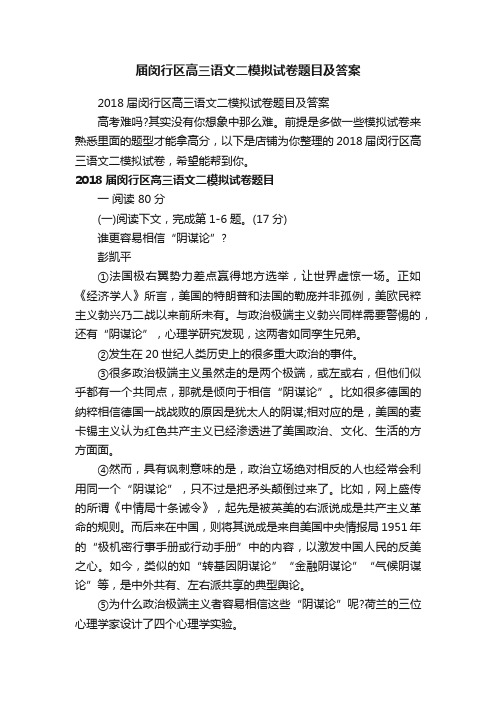
届闵行区高三语文二模拟试卷题目及答案2018届闵行区高三语文二模拟试卷题目及答案高考难吗?其实没有你想象中那么难。
前提是多做一些模拟试卷来熟悉里面的题型才能拿高分,以下是店铺为你整理的2018届闵行区高三语文二模拟试卷,希望能帮到你。
2018届闵行区高三语文二模拟试卷题目一阅读 80分(一)阅读下文,完成第1-6题。
(17分)谁更容易相信“阴谋论”?彭凯平①法国极右翼势力差点赢得地方选举,让世界虚惊一场。
正如《经济学人》所言,美国的特朗普和法国的勒庞并非孤例,美欧民粹主义勃兴乃二战以来前所未有。
与政治极端主义勃兴同样需要警惕的,还有“阴谋论”,心理学研究发现,这两者如同孪生兄弟。
②发生在20世纪人类历史上的很多重大政治的事件。
③很多政治极端主义虽然走的是两个极端,或左或右,但他们似乎都有一个共同点,那就是倾向于相信“阴谋论”。
比如很多德国的纳粹相信德国一战战败的原因是犹太人的阴谋;相对应的是,美国的麦卡锡主义认为红色共产主义已经渗透进了美国政治、文化、生活的方方面面。
④然而,具有讽刺意味的是,政治立场绝对相反的人也经常会利用同一个“阴谋论”,只不过是把矛头颠倒过来了。
比如,网上盛传的所谓《中情局十条诫令》,起先是被英美的右派说成是共产主义革命的规则。
而后来在中国,则将其说成是来自美国中央情报局1951年的“极机密行事手册或行动手册”中的内容,以激发中国人民的反美之心。
如今,类似的如“转基因阴谋论”“金融阴谋论”“气候阴谋论”等,是中外共有、左右派共享的典型舆论。
⑤为什么政治极端主义者容易相信这些“阴谋论”呢?荷兰的三位心理学家设计了四个心理学实验。
⑥研究一:该研究共招募了207名美国被试者,后来回收有效数据187份。
研究者测查了被试者对“金融危机阴谋论”和“气候变化阴谋论”的相信程度(从1到7);同时,为了进一步测试是否政治极端主义者只是对与政治有关的社会事件更加具有妄想症,实验还在两个“阴谋论”的分析中加入了一个“人际妄想症测试”。
2018年上海高考模拟考之二模作文题(精选5篇)

2018年上海高考模拟考之二模作文题(精选5篇)第一篇:2018年上海高考模拟考之二模作文题2018年上海高考模拟考之二模作文题汇编1.松江区、闵行区生活中,我们自以为是某个事件的关注者,其实,我们往往不明就里,只凑了个热闹,没过多久就忘记了,成为事件的忽视者。
请写一篇文章,谈谈你对这种现象的思考。
2.虹口区网络流行词“佛系”,最早来源于2014年日本某杂志,指一种怎么都行、无须走心、看淡一切的活法,一切随缘。
该词一出迅速流行,更有不少人自称佛系,有佛系追星、佛系购物、佛系恋爱、佛系员工、佛系学生等种种说法。
请写一篇文章,谈谈你对此的思考。
3.崇明区生活中,我们常常听到这样的抱怨,道理都懂,为什么不按照道理去做。
对此,你有怎样的思考?4.奉贤区冲突是指发生在两个或两个以上事物之间的互相对抗。
达伦多夫在《社会冲突论》中认为,冲突也是解决问题的有效方式。
5.黄浦区有人说,人生的麻烦,大多是因为太快说“是”,太慢说“不”造成的。
请写一篇文章,谈谈你对这句话的思考。
6.金山区我们每个人都生活在别人的眼光关注中。
这些眼光中有鼓励,有肯定,但也有质疑甚至否定,然而,掌控人生的往往是你自己。
7.浦东新区想出新办法的人在他的办法成功以前,人们总是说他异想天开。
针对这种现象,请写一篇文章谈谈你的思考。
8.普陀区生活中,我们往往有意无意地和他人进行各种比较。
有人认为这是人性的劣根、烦恼的根源,应该努力避免。
9.青浦区现实生活中经常面临着新的开始和旧的结束。
恋旧、怀旧是人之常情,但也有人说“相见不如怀念,怀念不如忘却”。
如何看待并处理好新的开始与恋旧怀旧的关系是需要智慧和勇气的。
10.徐汇区当了解信息的途径越来越丰富、方式越来越便捷,人们会更容易获取自己想关注的信息,从而将自己包裹在以个人需求为主导的世界里。
这种现象带给你怎样的思考?11.杨浦区世上没有移山的方法,唯一能改变我们和山的距离的途径是山不过来我过去,人们可以持有这样的态度,改变可以改变的一切,适应不能改变的一切。
2018.04闵行区初三语文二模试卷及答案您(K12教育文档)
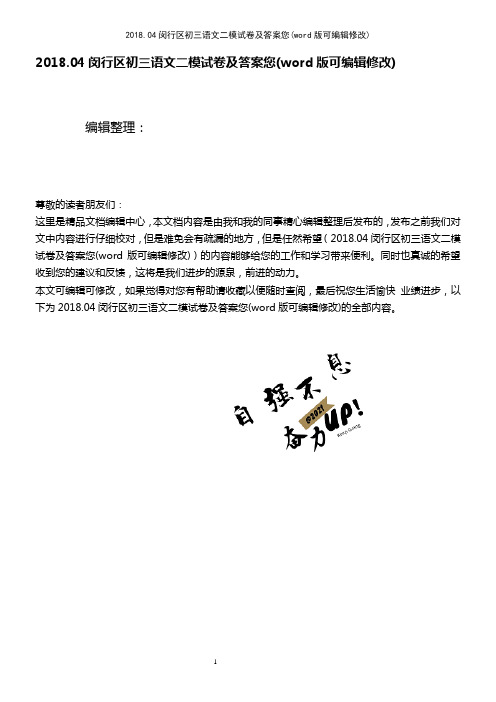
2018.04闵行区初三语文二模试卷及答案您(word版可编辑修改)编辑整理:尊敬的读者朋友们:这里是精品文档编辑中心,本文档内容是由我和我的同事精心编辑整理后发布的,发布之前我们对文中内容进行仔细校对,但是难免会有疏漏的地方,但是任然希望(2018.04闵行区初三语文二模试卷及答案您(word版可编辑修改))的内容能够给您的工作和学习带来便利。
同时也真诚的希望收到您的建议和反馈,这将是我们进步的源泉,前进的动力。
本文可编辑可修改,如果觉得对您有帮助请收藏以便随时查阅,最后祝您生活愉快业绩进步,以下为2018.04闵行区初三语文二模试卷及答案您(word版可编辑修改)的全部内容。
2018。
04闵行区初三语文二模试卷及答案您(满分:150分,考试时间100分钟)考生注意:1。
本试卷共有27题2。
请将所有答案做在答题纸的指定位置上,做在试卷上一律不计分。
一、文言文(40分)(一)默写。
(15分)1。
东边日出西边雨,____________________。
(《竹枝词》)2。
人生自古谁无死,____________________. (《过零丁洋》)3.____________________,浓睡不消残酒. (《如梦令》)4。
____________________,鸡犬相闻。
(《桃花源记》)5。
俶尔远逝,____________________。
(《小石潭记》)(二)阅读下面这首词,完成第6-7题。
(4分)蝶恋花伫倚危楼风细细,望极春愁,黯黯生天际.草色烟光残照里,无言谁会凭阑意.拟把疏狂图一醉,对酒当歌,强乐还无味。
衣带渐宽终不悔,为伊消得人憔悴。
6。
“无言谁会凭阑意”中的“意"在词中指“_______________".(2分)7.下列对这首词的理解有误..的一项是()(2分)A。
“残”字表达了主人公忧愁沮丧的心情。
B。
“黯黯”写出了夕阳残照之下景色的灰暗。
C.上阙情景交融,描写主人公登高望远春愁顿生之状。
2018年上海初三二模语文汇编(议论文)
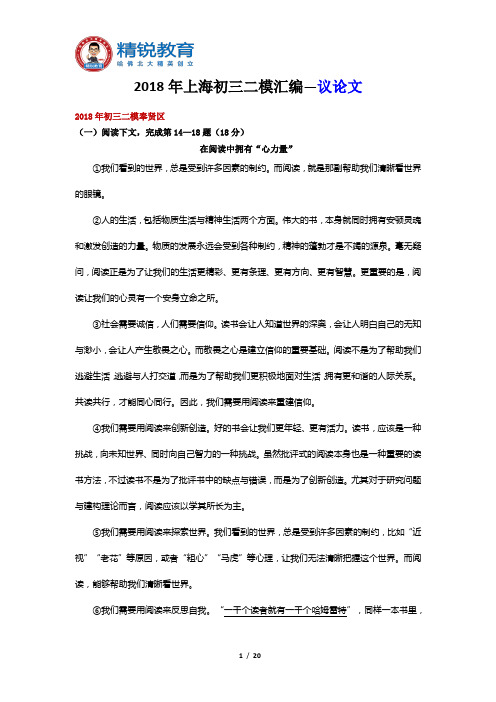
2018年上海初三二模汇编—议论文2018年初三二模奉贤区(一)阅读下文,完成第14—18题(18分)在阅读中拥有“心力量”①我们看到的世界,总是受到许多因素的制约。
而阅读,就是那副帮助我们清晰看世界的眼镜。
②人的生活,包括物质生活与精神生活两个方面。
伟大的书,本身就同时拥有安顿灵魂和激发创造的力量。
物质的发展永远会受到各种制约,精神的蓬勃才是不竭的源泉。
毫无疑问,阅读正是为了让我们的生活更精彩、更有条理、更有方向、更有智慧。
更重要的是,阅读让我们的心灵有一个安身立命之所。
③社会需要诚信,人们需要信仰。
读书会让人知道世界的深奥,会让人明白自己的无知与渺小,会让人产生敬畏之心。
而敬畏之心是建立信仰的重要基础。
阅读不是为了帮助我们逃避生活,逃避与人打交道,而是为了帮助我们更积极地面对生活,拥有更和谐的人际关系。
共读共行,才能同心同行。
因此,我们需要用阅读来重建信仰。
④我们需要用阅读来创新创造。
好的书会让我们更年轻、更有活力。
读书,应该是一种挑战,向未知世界、同时向自己智力的一种挑战。
虽然批评式的阅读本身也是一种重要的读书方法,不过读书不是为了批评书中的缺点与错误,而是为了创新创造。
尤其对于研究问题与建构理论而言,阅读应该以学其所长为主。
⑤我们需要用阅读来探索世界。
我们看到的世界,总是受到许多因素的制约,比如“近视”“老花”等原因,或者“粗心”“马虎”等心理,让我们无法清晰把握这个世界。
而阅读,能够帮助我们清晰看世界。
⑥我们需要用阅读来反思自我。
“一千个读者就有一千个哈姆雷特”,同样一本书里,每个读者所读到的、所汲取的,都带有个人色彩。
每个真正用心阅读的人,总是能够在书中寻找到自己,从而通过行动,去寻找有意义的人生。
⑦当然,读书需要循序渐进。
不同的书会组成一个自然的阶梯,引导我们去攀登思想与智慧的高峰。
所以,当我们被一本书阻拦的时候,不要自暴自弃,可以寻找另外更合适的书作为再次攀越这本书的阶梯。
⑧没能养成阅读习惯的人,不妨从现在行动。
2018年二模试卷分析

2018年二模试卷分析(四)课外文言文阅读1.词语解释徐比(杨浦)从归(徐汇)食卒(黄浦)之绝(奉贤)亡使(闵行)众师(长宁)归易(金山)会诣(青浦)过虑(静安)使(一为名词,一为动词,考察“使”的两个意思);兵(考察其两个意思)(嘉定宝山)定号(崇明)易致(松江)遗过(普陀)从对文言词解释的考察来看,整体难度不大,大部分区考察的都比较常规,是平时阅读训练中常见的词语,学生很容易从课本直接迁移。
松江区考察“致”,有些难度,学生不常碰到这个词,但是联系学过的文章也可以快速确定答案。
2.句子翻译(1)闻玮利牛羊而师不整,遽还袭之。
(杨浦)(敌军)听说曹玮贪图牛羊之利(贪图牛羊这些小利)而军容不严整,立刻就返回袭击曹玮军队。
(2)今何不乐之甚?(D)(徐汇)A.今天为什么不高兴?B.今天为什么不高兴到那里?C.今天哪里会不高兴呢?D.今天为什么那么不高兴?(3)昔者纣为象箸而箕子怖。
(黄浦)当年(从前)纣王使用象牙筷子,箕子(见了)感得害怕。
(得分点:昔者、为、而、怖)(4)赋易之,对饮酒(C)(奉贤区)A两个强盗互相交换了位置,面对面(一起)喝喝酒,醉了B.两个强盗轻视他,对付着喝酒,醉C.两个强盗轻视他,面对面(一起)喝喝酒,醉了。
D.两个强盗互相交换了位置,对付着喝酒,醉了。
(5)以父老,弃官家居十余年(闵行区)因为父亲年老,他辞官在家十多年。
(6)君人不困于厄,不鼓不成列。
(B)(长宁区)A.君子不围困陷入厄运的敌人,不击鼓没有排好阵势的敌人。
B.君子不围困陷入厄运的敌人,不攻打没有排好阵势的敌人。
C.君子不围困厄运的敌人,不攻打没有排好阵势的敌人。
D.君子不围困厄运的敌人,不击鼓没有排好阵势的敌人。
(7)岂敢烦郡守父老致迎,是重其过也。
(C)(金山区)A.怎么敢厌烦郡守父老相迎,这样会加重我的过错的。
B.怎么敢厌烦郡守父老相迎,这样会重蹈我的过错的。
C.怎么敢烦劳郡守父老相迎,这样会加重我的过的。
2018二模作文题分析
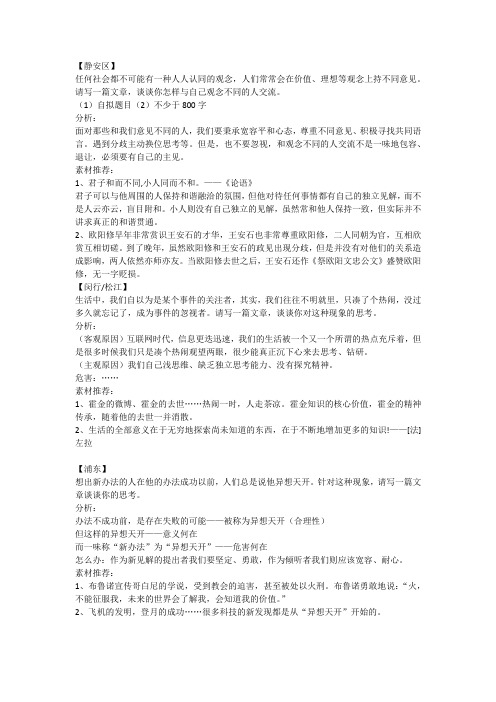
任何社会都不可能有一种人人认同的观念,人们常常会在价值、理想等观念上持不同意见。
请写一篇文章,谈谈你怎样与自己观念不同的人交流。
(1)自拟题目(2)不少于800字分析:面对那些和我们意见不同的人,我们要秉承宽容平和心态,尊重不同意见、积极寻找共同语言。
遇到分歧主动换位思考等。
但是,也不要忽视,和观念不同的人交流不是一味地包容、退让,必须要有自己的主见。
素材推荐:1、君子和而不同,小人同而不和。
——《论语》君子可以与他周围的人保持和谐融洽的氛围,但他对待任何事情都有自己的独立见解,而不是人云亦云,盲目附和。
小人则没有自己独立的见解,虽然常和他人保持一致,但实际并不讲求真正的和谐贯通。
2、欧阳修早年非常赏识王安石的才华,王安石也非常尊重欧阳修,二人同朝为官,互相欣赏互相切磋。
到了晚年,虽然欧阳修和王安石的政见出现分歧,但是并没有对他们的关系造成影响,两人依然亦师亦友。
当欧阳修去世之后,王安石还作《祭欧阳文忠公文》盛赞欧阳修,无一字贬损。
【闵行/松江】生活中,我们自以为是某个事件的关注者,其实,我们往往不明就里,只凑了个热闹,没过多久就忘记了,成为事件的忽视者。
请写一篇文章,谈谈你对这种现象的思考。
分析:(客观原因)互联网时代,信息更迭迅速,我们的生活被一个又一个所谓的热点充斥着,但是很多时候我们只是凑个热闹观望两眼,很少能真正沉下心来去思考、钻研。
(主观原因)我们自己浅思维、缺乏独立思考能力、没有探究精神。
危害:……素材推荐:1、霍金的微博、霍金的去世……热闹一时,人走茶凉。
霍金知识的核心价值,霍金的精神传承,随着他的去世一并消散。
2、生活的全部意义在于无穷地探索尚未知道的东西,在于不断地增加更多的知识!——[法]左拉【浦东】想出新办法的人在他的办法成功以前,人们总是说他异想天开。
针对这种现象,请写一篇文章谈谈你的思考。
分析:办法不成功前,是存在失败的可能——被称为异想天开(合理性)但这样的异想天开——意义何在而一味称“新办法”为“异想天开”——危害何在怎么办:作为新见解的提出者我们要坚定、勇敢,作为倾听者我们则应该宽容、耐心。
上海市闵行区2018年中考(二模)学科质量检测语文试题及答案(word版)

闵行区2017~2018年初三第二学期中考语文质量抽查试卷(满分:150分考试时间:100分钟)2018.4考生注意:1.本试卷共28题。
2.请将所有答案做在答卷上,做在试卷上一律不计分。
一、文言文(40分)(一)默写(15分)1.东边日出西边雨,__________________。
(《竹枝词》)2.人生自占准无死,__________________。
(《过零丁洋》)3.__________________,浓睡不消残洒。
(《如梦令》)4.__________________,鸡犬相闻。
(《桃花源记》)5.傲尔远逝,__________________。
(《小石潭记》)(二)阅读下面这首词,完成第6-7题(4分)蝶恋花伫倚危楼风细细,望极春愁,黯黯生天际。
草色烟光残照里,无言谁会凭阑意。
拟把疏狂图一醉,对酒当歌,强乐还无味。
衣带渐宽终不悔,为伊消得人憔悴。
6.“无亩谁会凭阑意”中的“意”在词中指“___________”。
(2分)7.下列对这首词的理解有误..的一项是( ) (2分)A.“残”字表达了主人公忧愁沮丧的心情。
B.“黯黯”写出了夕阳残照之下景色的灰暗。
C.上阕情景交融,描写主人公登高望远春愁顿生之状。
D.下阕直抒胸臆,抒写主人公苦中求乐情深志坚之意。
(三)阅读下文,完成第8-10题(9分)①臣本布衣,躬耕于南阳,苟全性命于乱世,不求闻达于诸侯。
先帝不以臣卑鄙,猥自枉屈,三顾臣于草庐之中,咨臣以当世之事,由是感激,遂许先帝以驱驰。
后值倾覆,受任于败军之际,奉命于危难之间,尔来二十有一年矣。
②先帝知臣谨慎,故临崩寄臣以大事也。
受命以来,夙夜忧叹,恐托付不效,以伤先帝之明。
故五月渡泸,深入不毛。
今南方已定,兵甲已足,当奖率三军,北定中原,庶竭驽钝,攘除奸凶,兴复汉室,还于旧都。
此臣所以报先帝,而忠陛下之职分也。
至于斟酌损益,进尽忠言,则攸之、神、允之任也。
③愿陛下托臣以讨贼兴复之效,不效,则治臣之罪,以告先帝之灵。
- 1、下载文档前请自行甄别文档内容的完整性,平台不提供额外的编辑、内容补充、找答案等附加服务。
- 2、"仅部分预览"的文档,不可在线预览部分如存在完整性等问题,可反馈申请退款(可完整预览的文档不适用该条件!)。
- 3、如文档侵犯您的权益,请联系客服反馈,我们会尽快为您处理(人工客服工作时间:9:00-18:30)。
2018年闵行二模作文讲评【试题】阅读下面材料,根据要求作文。
生活中,我们自以为是某个事件的关注者,其实,我们往往不明就里,只凑个热闹,没过多久就忘记了,成为事件的忽视者。
请写一篇文章,谈谈你对这种现象的思考。
要求:(1)自拟题目;(2)不少于800字【命题意图】教研员王林老师命题的灵感来源于霍金去世后引起的“霍金热”这一现象。
霍金去世后,许多网友自行悼念霍金,然而其中不乏对霍金根本不了的盲从者和追逐潮流的附庸者。
社会上类似的现象屡见不鲜,如杨绛百年离世时,微信朋友圈对其名言的转发,然而其中一些名言是存在杜撰或是断章取义的现象。
针对这样一类现象,命题由此产生。
材料又明显一组对立概念,即关注者与忽视者。
命题者希望学生能够对关注与忽视两者之间的关系进行思考。
在构建两者逻辑关系时,命题者又给了学生一些逻辑提示,如不明就里、凑个热闹、没过多久忘记了。
学生需要从这样的逻辑提示中提炼出自己的看法和观点。
命题直指社会现实,希望学生能够关注生活,反思现实,能在表达对社会和世界的认知中得到一种普世的价值观,得到认知事物、认知事理的方法。
【试题分析】1. 讨论对象的确定:材料中“关注者”与“忽视者”的对象是事件。
而事件一词材料中其实隐含的是关乎公众利益,与社会整理利益相关的事件。
※友情提醒:学生在例证与论述的过程中需要注意尽量不要使用个人的事情作为例证,此外学生需要将事件与事实、事情区分开来,不能混为一谈,或偷换概念。
2. 逻辑关系的构建:“自以为是”、“不明就里”、“凑热闹”、“没过多久”。
1)自以为是某个事件的关注者:“自以为是”四个字实则有双重含义:一层是时代的必然性:自以为是关注者的本质实际就是忽视者,这是一种时代的必然,如今网络时代下,信息传播速度过快过频,信息呈碎片化的趋势。
民众在获取的信息可能是片面的,断章取义的,甚至是错误的——“不是事件的真相,而是媒体想让我们看到的事件真相”。
另一层是人缺乏真正的感同身受:庄子与惠子游于濠梁之上。
惠子所言:“子非鱼,安知鱼之乐?”同样的道理,民众若不是事件当事人本身,怎能切肤感受到当事人的心境?2)由此可以产生更为深入的原因分析.......:①公众面对事件时主观情绪的释放,如网络上的“键盘侠”,口水的骂战……②以旁观者的姿态进行不痛不痒的评论,看似有同情与关注,实则是如鲁迅小说“药”一看的“看客”心理与“围观”状态。
其中也有可能是人对外界事件的猎奇心态。
③民众受到世俗讨论下的裹挟,以热点事件作为茶余饭后的谈资和附和,甚至是一种追逐时代潮流,追逐社会热点话题的“凑热闹”心态。
3. 由此可以谈及此类现象对于社会的危害:①人人都可能成为事件的忽视者,随着时间的遗忘,没有人对这种公共利益和社会弊病进行追问,个人将丧失对于社会的责任感和使命感,甚至社会的价值体系就此崩塌。
②真相探究欲望的降低,社会出现了病态,如“佛系”文化、“丧”文化、加缪所言的“局外人”现象等等。
4. 就此,我们需要怎样价值判断?①“无尽远方、无数人们与我有关”的同理心与真情实感。
②建立起公平、正义、善良、真诚、追求真相,不人云亦云,不跟风盲从的价值体系。
③“一事当前,先问真假,再说是非,后说利害”的评论氛围。
5. 如何做到真正的关注?①后真相的时代建立起真相意识、树立社会责任感与家国情怀。
②在他人的事件中拷问自我的良知进行自我审视,由此架起了人与社会的同情的纽带(人类命运共同体)【扩展阅读】(一)谁制造了名人“被死亡”事件?近日,歌唱家于文华错误发微博称,词曲家阎肃在空军总医院因病去世。
随后,在未经核实的情况下,多家媒体仓促推出报道。
然而,阎肃家人很快证实,这是一则名人“被去世”的乌龙消息。
尽管阎家人事后表示不会苛责假消息传播者,但这起风波无疑值得媒体从业者深刻反思。
随着信息渠道的丰富,近年来名人“被死亡”事件时有发生,甚至呈愈演愈烈之势。
一方面,社交媒体空前发展,人人都拥有新闻发布权,在互联网上信息鱼龙混杂,对于媒体甄别判断能力提出挑战;另一方面,“首发率”与媒体人的考核挂钩,客观上使媒体人不得不面对竞相拼抢报道新闻的压力,为了首发率的大胆操作和为了公信力的谨慎选择如何平衡,是摆在媒体人面前一个现实而紧迫的问题。
媒体人为何丧失职业操守?在文艺界,类似名人去世的假新闻现象早已屡见不鲜,本应严肃对待的新闻报道却变得如此不严肃,不禁引人深思。
名人去世消息,一向是媒体关注的重点,抢发或独家发布一条名人去世的新闻能赚到不少阅读量、点击量。
正因名人效应的存在,不少媒体往往会盯着他们的生死,以至于某一天听到风吹草动,就不分真假,争相转发假消息。
从金庸到洪金宝、成龙,从小沈阳到姜文,近年来“被死亡”的名人着实不少,阎肃老爷子这次算是“躺枪”。
诚然,名人去世是重大消息,媒体力争在第一时间抢发也无可厚非。
但事到临头,有些公共媒体往往处理得极不严肃,毫无新闻专业精神可言。
比如,他们采用的消息,往往来源于并不可靠的自媒体,如个人的微博、微信发布的信息。
而为了抢时间,一些公共媒体的官微也根本不加核实、甄辨,就加以转发,并点上蜡烛送上“一路走好”的祝福语,实在是荒谬至极,且丧失了追求真实的新闻基本节操。
在今天自媒体泛滥的时代,公共媒体随意转发自媒体消息已成为“习惯”,很容易转发假新闻,闹出令人尴尬的乌龙。
时效性,最能体现新闻机构的实力,所以各大媒体竞相追逐,重要性不言而喻,不过“爆点、夺关注、涨粉”现在已经让时效性慢慢变了样子。
蒙蔽住眼睛的媒体们,新闻的准确性才是报道的生命之本。
新媒体零时差、及时性的同时,就会被假新闻打入被动模式,接着是辟谣再道歉。
网络时代,媒体抢新闻可以理解,不过追求“快”的同时不能把“真”丢掉。
在阎肃去世这样一个严肃的新闻上,我们看到得却是极不严肃的媒体传播态度。
半小时后,于文华删除了之前的微博并声称“郑重声明:刚刚所转阎肃老师的消息不实,严重失误,向老人家及家属严重道歉!”匆忙中还打错了阎肃的名字。
之后,于文华再度删除错字微博重新致歉“就刚刚误转阎肃老师的消息不实,郑重向大家道歉,向家人道歉!”原来阎肃老先生正在医院疗养,一切安好,“去世”一闻不实,转发的媒体迅速删了微博,灭了蜡烛,又一起乌龙事件。
对于常人来讲,说错话是常有的事,媒体不经核实,为抢新闻匆忙转发,这一行为,既伤害当事人和公众的感情,更是伤及媒体最珍贵的“公信力”。
乌龙新闻产生的罪魁祸首自媒体时代,人人都有麦克风。
有了麦克风,就有了话语权焦虑——唯恐声音不够大,生怕爆料不够猛。
至于真假、是非、利害,则统统让位于争夺话语权的无硝烟之战。
这从公众账号上铆足了劲的“出位”比拼就能窥见一二。
于是,各路媒体更容易一路飞奔在“时效”的路上。
名人去世消息,一向是媒体关注的重点,抢发或独家发布一条名人去世的新闻能赚到不少阅读量、点击量,而这阅读量,点击量往往与考核与薪酬等多项利益挂钩,压力之下,某一天听到名人消息风吹草动,就不分真假,争相转发假消息。
信源单一、张冠李戴、抢发新闻等等都是乌龙新闻产生的罪魁祸首。
造成报道失误的客观条件是偶发的,也是复杂的,然而媒体在面对来自公众越来越多的责问和不信任时,也必须反思己过。
近期发生的几则乌龙事件,均是由于主观或客观条件的原因,只求抢发,不问真假。
对新闻的采访和调查不全面、不细致、不准确、不深入,信源单一且经不起核实。
这种“技术性失实”的危害几乎已经成为社会共识,不仅降低新闻媒体公信力,危及新闻媒体生存,而且对公众造成精神损害。
新闻的本质在于真实——这是最基本的新闻伦理,也是最朴素的传播规律。
无论我们身处哪个媒体时代,时效固然重要,但虚假新闻对于媒介公信力的伤害,可能是无数“第一时间”也难以弥补的信任之殇。
早在主编《莱茵报》时期,马克思、恩格斯就指出,“真实”和“纯洁”是报刊的本质。
媒体发布有媒体发布的程序,随手转亦有随手转的规矩。
在网络信息时代,尤其在发布攸关公共利益的重大新闻时,如果媒体能够遵循是非判断的基本逻辑,严谨细密一些,再耐心等几分钟,也许就会离真相更近一步。
损失的公信力如何找回?避免乌龙新闻的发生,其实并没有那么难。
资深媒体人刘健曾说过:一事当前,先问真假,再断是非,再说利害。
今年3月,李光耀病危,却被媒体提前宣布“去世”,虽然传统媒体派出大批记者驻守在李光耀入住的新加坡中央医院外,但部分世界级媒体依然过于相信互联网流传的消息。
美国著名电视机构CNN的“推特”账号抢发了一条由16个英文单词组成的消息,称李光耀逝世。
消息一经发布,旋即得到522次转发和315个赞。
虽然此后CNN 删除了此条消息,并连续播报了两条辟谣帖,但不良影响已经造成。
当然中国媒体也未能幸免。
央视国际频道抢播了“李光耀去世”的快讯,而某新闻网的手机客户端更是将头条新闻的标题赫然做成了“新加坡开国总理李显龙逝世”,倘若在转发之前多一道核实程序,向驻守中央医院的记者们问问消息真假,再做转发,就不会出现这等乌龙事件。
另外,遭遇突发事件,耐心等待准确结果,不要靠主观臆断而“抢发新闻”,2013年9月8日凌晨,国际奥委会第125次大会在阿根廷首都布宜诺斯艾利斯举行,东京在与马德里、伊斯坦布尔的竞争中胜出,最终获得2020年夏季奥运会主办权。
而央视、新华网都出现乌龙,央视提前宣布“东京被淘汰”,新华社提前发快讯“伊斯坦布尔胜出”,本该等到最后一秒钟,出了真实结果再去发布信息。
记者开始采用非专业网络媒体的信息来源,难以避免地会损害新闻报道的真实性和可信度。
因此,国外一些专业新闻机构特别在媒体规约中加入了有关社交媒体的使用守则,要求记者在采用网络消息时一定要核实信息,如《美联社员工社交媒体使用守则》中规定“当新闻当事人在社交网络上发布了重大信息时,除非该新闻当事人的账号被证明是真实可信的,才可以自由转发或分享那条原始信息。
”倘若我们借鉴这种详细而有执行力的规范,一定程度上可以对如今媒体上的乌龙乱象起到遏制作用。
每次有媒体发布乌龙新闻之后,都有网友呼吁要加强对相关责任人的惩罚。
这种惩罚当然很有必要,但加强自律更为关键。
只有从内心深处守住真实的底线,增强社会责任感和职业担当, 坚守新闻专业精神,慎重对待一些耸人听闻的消息不断提高自身的媒介素养和职业操守,才能从源头上当好网络空间里的“把关者”。
媒体不是文字的搬运工,在新闻与公众“见面”之前,对信息真实性的核实是最重要的一道工序。
如果一味盯着名人的生死,却又不对信息进行核实,等到失信于人,媒体变成“狼来了”的主人公,则是自己搬石头砸脚,堵了自己的前路。
不管是多大的媒体,一旦丧失了公信力,就等于丧失了生命力,假新闻恰恰有损媒体的公信力。
倘若能吸取此次事件的教训,避免再闹名人去世的乌龙新闻,对媒体同行来说也未必不是好事。
毕竟,真实是新闻的生命;毕竟,公信力是媒体生存的根基。
